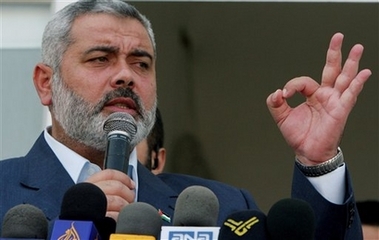GAZA CITY, Gaza Strip - Palestinian Prime Minister Ismail Haniyeh of Hamas
said Friday he will not head a government that recognizes Israel, striking a
potential blow to President Mahmoud Abbas' attempts to create a national unity
government.
Haniyeh spoke a day after Abbas indicated at the United Nations that a
coalition government of Hamas and Abbas' Fatah movement would recognize the
Jewish state.
|

Palestinian Authority Prime Minister Ismail Haniyeh of the
Islamic group Hamas speaks to Hamas supporters during a rally in front of
his office in Gaza City Wednesday Sept. 20, 2006.
[AP]
|
"I personally will not head any government that recognizes Israel," Haniyeh
said in a mosque sermon in Gaza City, laying out his group's position in
coalition talks with Abbas.
However, Haniyeh said Hamas is ready to establish a Palestinian state in the
West Bank, Gaza and east Jerusalem ¡ª areas Israel captured in the 1967 Mideast
War ¡ª and to honor a long-term truce with Israel.
"We support establishing a Palestinian state in the land of 1967 at this
stage, but in return for a cease-fire, not recognition," Haniyeh said.
Abbas was still in New York and couldn't be immediately reached for comment
on Haniyeh's remarks. A close adviser, Nabil Amr, clarified that the Palestinian
president would not ask Hamas to explicitly recognize Israel, but to abide by
Palestine Liberation Organization agreements that recognize the Jewish state.
"We expect Hamas to agree to this," Amr said.
Hamas, which swept Palestinian parliamentary elections in January, currently
rules alone. But Abbas, elected separately last year, has been toiling for
months to broaden the government in the hope of easing crushing international
sanctions imposed on the Hamas-led government to force it to soften its violent
anti-Israel ideology.
Last week, the two sides announced they would govern together, and strive to
establish a Palestinian state alongside Israel ¡ª an objective that implies
recognition of the Jewish state.
But coalition talks have faltered because the West and Israel have balked at
restoring hundreds of millions of dollars in funding until Hamas clearly states
its willingness to recognize Israel, renounce violence and accept existing peace
agreements between Israel and the Palestinians.
Israeli government spokeswoman Miri Eisin reiterated Israel's demand that any
Palestinian government yield to the demands the international community has
imposed.
Abbas told a U.N. forum Thursday that the national unity government would
commit to all past agreements between the Palestinians and Israel, including
letters exchanged by the two sides in 1993 that call for mutual recognition and
the renunciation of violence.
Officials from both Fatah and Hamas said privately that it wasn't clear
whether Abbas' speech was meant to solicit international support for the planned
government, or a new condition to forming a coalition with Hamas.
In deciding to form a coalition with Fatah, Hamas had agreed to "respect"
past agreements, but didn't commit to them, calling into question Abbas' ability
to maneuver in any future peacemaking. Hamas is afraid that committing to past
agreements would be tantamount to recognizing Israel, which it is sworn to
destroy.
Earlier Friday, Haniyeh's political adviser, Ahmed Yousef, said instead of
recognizing Israel, Hamas was prepared to agree to a "long-term truce for five
or 10 years, until the occupation withdraws."
In the past, Hamas has offered a long-term truce in exchange for an Israeli
commitment to withdraw from all of the West Bank and east Jerusalem, captured in
the 1967 Mideast war. Israel rejects that demand.
Yousef said renouncing violence was a clause of the agreement underlying the
planned coalition government. He was unclear on what Hamas would do if coalition
talks break down.
A spokesman for the Hamas-led government, Ghazi Hamad, said the group would
ask Abbas to clarify his remarks after he returns from his
trip.